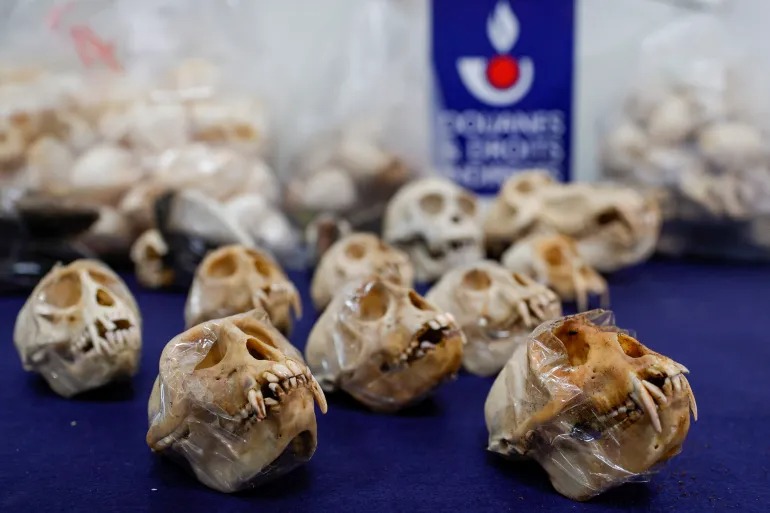Customs officials at Charles de Gaulle Airport in Paris have announced the seizure of nearly 400 primate skulls, most of them originating from Cameroon and intended for recipients in the United States. The seven-month operation, spanning from May to December 2022, exposed a sinister trade in protected species, shedding light on a lucrative black market that rivals the illegal trades in drugs, weapons, and human trafficking. This shocking discovery has raised concerns about the endangered biodiversity and the ethical consequences of this gruesome commerce.
Uncovering the Sinister Trade
Customs agents at Charles de Gaulle Airport revealed on Thursday that they intercepted a staggering 392 packages during the operation last year, all containing primate skulls primarily from Cameroon. Additionally, hundreds of packages containing skulls or bones from other species were also confiscated. Notably, none of these items possessed any legal authorizations for the sale of protected species, according to customs officials.
A Lucrative but Sordid Business
Airport customs chief Gilbert Beltran, while displaying the extensive haul of skulls, jaws, and horns from protected species, described the illicit trade as “sordid.” He emphasized that trafficking in protected species is now one of the most profitable illegal activities, trailing closely behind the likes of drug, weapon, and human trafficking. Estimates suggest that this dark industry generates a staggering 8 billion to 20 billion euros ($8.5bn to $21.3bn) annually.
Primates for Collectors and Hunting Clubs
Reports indicate that the seized primate skulls were likely destined for collectors and hunting clubs in the United States, where they are given as gifts or prizes. Some of the intercepted packages even contained entire animals or forearms with hands. This revelation has sent shockwaves through conservation circles, highlighting the demand for such macabre trophies in certain segments of society.
Customs officials first stumbled upon the monkey skull trade in May 2022, when they uncovered seven skulls sent from Africa. Subsequent investigations intensified, leading to the discovery of dozens more primate skulls, predominantly from the cercopithecoid family, including macaques, baboons, and mandrills, as well as chimpanzees. Fabrice Gayet, a customs expert in animal trafficking, revealed that these primates are usually hunted for meat, and the sale of their skulls appears to be a profitable, follow-on business.
Small primate skulls fetch prices ranging from 30 to 50 euros ($32 to $53) each, while larger ones command values between 400 to 500 euros ($426 to $532). Astonishingly, chimpanzee skulls can fetch up to 1,000 euros ($1,065) each. Moreover, this illicit industry extends beyond primate remains, encompassing other endangered species such as otters, big cats, lizards, and birds of prey.
In a bid to gain deeper insights into this disturbing trade, the seized primate skulls will be handed over to the Museum of Natural History in Aix-en-Provence, located in southern France, for scientific evaluation. Professor Sabrina Krief, an ape expert at the museum, expressed her dismay, stating, “I am stunned to think that our closest relatives, apes and great apes, are being decimated, and rainforests robbed of their endangered biodiversity for a business that is as stupid as it is outrageous.”
The apprehension of nearly 400 primate skulls at a major international airport serves as a stark reminder of the pressing need for global cooperation in combating wildlife trafficking and preserving our planet’s invaluable biodiversity.
















